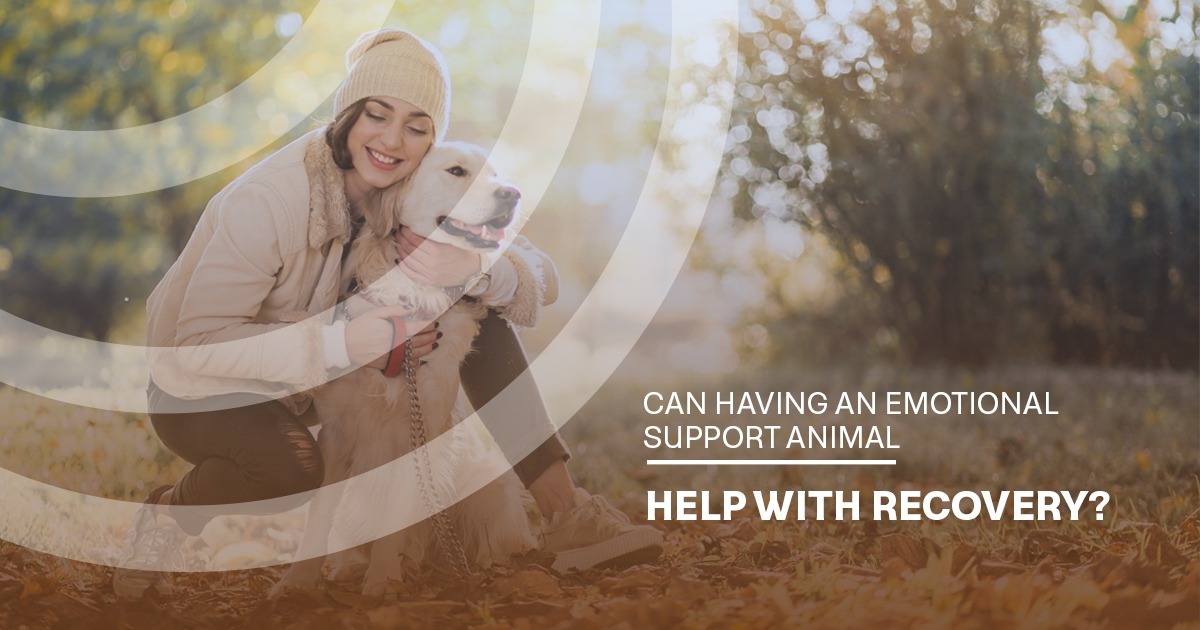
There are so many different things that can help you stay grounded and on track in your recovery, but perhaps none is better than a pet. Pets can be considered emotional support animals when they help someone in recovery, and they can also be part of recovery and treatment itself.
What is an Emotional Support Animal?
An Emotional Support Animal (ESA) is a pet that is recommended by a therapist to help with emotional issues. This differs from a Service Animal, as service animals are professionally trained to help with specific issues.
An ESA isn’t trained to do anything in particular, however, having pets or the company of animals is scientifically proven to help with many mental and physical symptoms; such as anxiety, blood pressure, depression, and more.
What is Animal-Assisted Therapy in Treatment?
When you go to an addiction treatment program, whether inpatient or outpatient, it’s typical for many different types of therapy to be used; for example, you may do cognitive-behavioral therapy or a different kind of talk therapy (one-on-one with a counselor or in a group.) You might also do yoga, art therapy, music therapy, or other holistic therapies.
Animal-assisted therapy can fall into the larger category of holistic therapy during addiction treatment.
Medical professionals don’t just use emotional support animals for substance abuse treatment. Animal-assisted therapy benefits people with other mental health disorders/illnesses, like Alzheimer’s, and even incarcerated people. Animal-assisted therapy is also being looked at for its potentially valuable role in helping children with an autism spectrum disorder.
Animal-assisted therapy has been shown in research to help reduce depression and anxiety as well as aggression. It can help participants feel calmer and overall better. There’s even research that has found dog visits can reduce physical pain and related symptoms.
Specifically, research has found benefits of animal-assisted therapy that include the following:
- When humans interact with animals, it can promote hormones like oxytocin, serotonin, and prolactin. Those hormones play a role in improving mood, and they can create a relaxation response.
- Animal interaction can help improve mental stimulation.
- Using animals as part of therapy can reduce anxiety, increase relaxation, and provide comfort and reduce loneliness.
- There’s some evidence that animal therapy can help reduce initial resistance to treatment, including substance abuse treatment.
- Researchers have found that animals as part of therapy can lower blood pressure and improve heart health.
- In substance abuse treatment, animal therapy helps people with trauma hesitate to talk about their situation.
- Another specific benefit of animal therapy and the use of an emotional support dog in addiction treatment is that animals can distract from triggers or cravings.
Generally, in an addiction treatment program, there is either canine-assisted therapy or equine therapy. Canine assistance therapy using an emotional support dog can help open up lines of communication. Specifically, studies have found that when a dog is in a rehab facility, the clinicians can gain more insight into their patients, which can help them provide better treatment.
With equine therapy, not only do you do horseback riding, but you may also provide care for the horse, such as feeding, cleaning, and grooming. That gives a sense of responsibility to patients who are recovering from addiction.
Equine therapy can also be beneficial because horses are so powerful and gradually develop trust with the humans around them; this creates a bonding opportunity for people in recovery.
Equine therapy can also help with recovery as addicts learn how to control their emotions because being overly emotional or having an outburst around a horse will diminish the sense of trust.

How Can an Emotional Support Animal Help Your Recovery After Treatment?
While it’s increasingly common for animals to be part of rehab programs, having a pet when you leave treatment can be beneficial too. For example, many people find that having a dog is a tremendous part of helping them stay sober.
- If you’re ready for the commitment and have the resources and stability for a pet, it can help you keep negative emotions such as depression or anxiety under control.
- Since pets do trigger positive emotions, this is an excellent way to avoid relapse triggers.
- When you’re around a dog, for example, it lowers cortisol levels. Cortisol is a stress hormone. Stress and anxiety are big triggers for relapse, so anything you can do to combat those feelings is suitable for your recovery.
- Having a pet creates a sense of unconditional support and love which is key to maintaining sobriety. When you leave treatment, you may still be working on rebuilding your relationships with humans, but a pet offers a non-judgmental relationship. There’s comfort in the relationship with pets.
- Even beyond creating positive feelings and reducing stress and loneliness, something beneficial about pet ownership in recovery forces you to have a routine and be responsible for something aside from yourself. You have to schedule times to feed and walk your pet, take him to the vet, plan ahead if you’re going out of town, and more. These are life skills that are rewarding for you to learn.
- Having a pet can help you get out and about more, so you aren’t sitting inside all the time. You have to walk your dog, so you’re going to get off the couch and get fresh air, even when you don’t want to.
- Getting an ESA is a good shift for your perspective if you’re feeling a bit stuck, and you’ll also be active. When you’re engaged, it helps you stay sober and promotes better mental and physical health.
Finally, when you have a pet, especially a dog, it may encourage you to socialize. Dog owners often bond with one another at the dog park or around the neighborhood. You can meet new people who will be a positive force in your life thanks to your dog.
Are You Ready for a Pet in Recovery?
If you’re considering an emotional support animal, you need to make sure you’re ready for the responsibility.
You’ll have to learn more about pet ownership first to make sure you understand the full responsibility. A few other things to consider before you get a pet in recovery include:
- Are you financially ready? A pet will have costs, even if you’re adopting. Think about how things like food, vet visits, and other supplies will impact your budget.
- Do you have enough space? If you live in a smaller home or apartment, you may still be able to get a pet, but you will have to limit your options based on the space you have available.
- Do you have the time to dedicate to a pet? If you’re going to get a dog, you will have to commit to going on daily walks and spending time caring for your pet.
Many people find that having an emotional support animal in treatment or as a pet after treatment is one of the most important and rewarding parts of their recovery. There are genuine, studied benefits of pets in recovery, and they can help you make progress in so many areas of your life, as long as you’re ready for the responsibility.
Having an emotional support animal is an option that goes well with other treatment options for addiction recovery. Anchored Tides Recovery can help assist you and your furry friend with your long-term goals of recovery. Contact one of our care coordinators today for a free consultation.



























